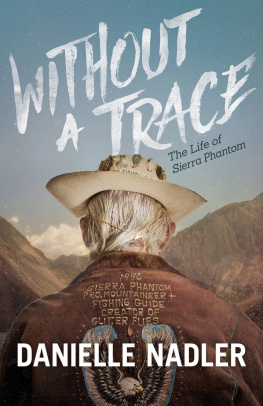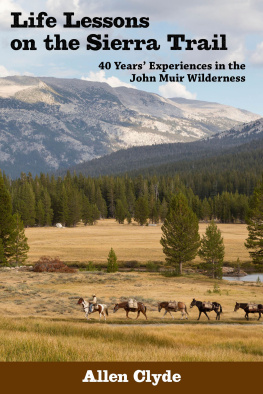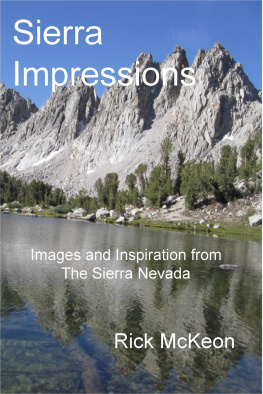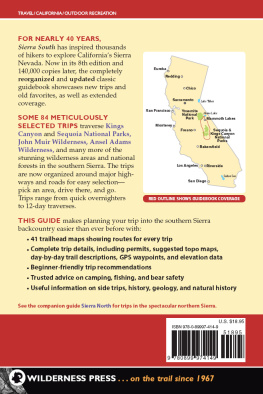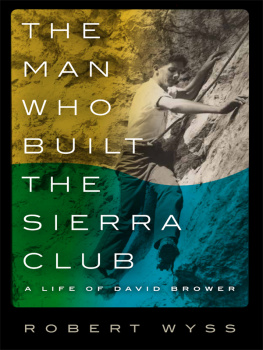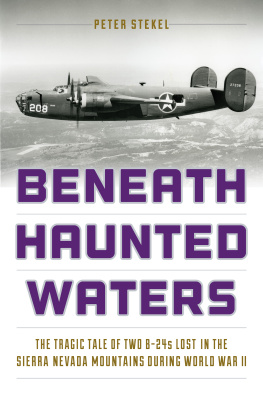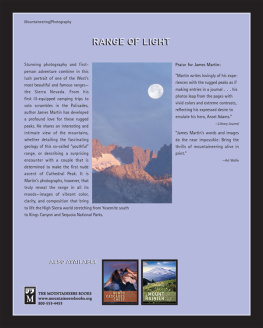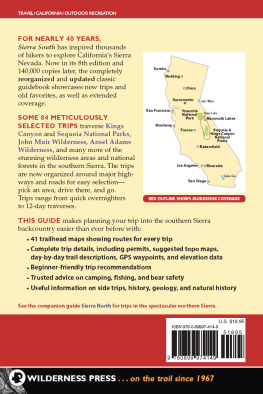

The Life of Sierra Phantom
Danielle Nadler

NEW YORK
LONDONNASHVILLEMELBOURNEVANCOUVER
Without A Trace
The Life of Sierra Phantom
2018 Danielle Nadler
All rights reserved. No portion of this book may be reproduced, stored in a retrieval system, or transmitted in any form or by any meanselectronic, mechanical, photocopy, recording, scanning, or otherexcept for brief quotations in critical reviews or articles, without the prior written permission of the publisher.
Published in New York, New York, by Morgan James Publishing. Morgan James is a trademark of Morgan James, LLC. www.MorganJamesPublishing.com
The Morgan James Speakers Group can bring authors to your live event. For more information or to book an event visit The Morgan James Speakers Group at www.TheMorganJamesSpeakersGroup.com.
ISBN 9781683507895 paperback
ISBN 9781683507901 eBook
Library of Congress Control Number: 2017915424
Cover Design by:
Nathaniel Navratil
Interior Design by:
Paul Curtis
Photographs of Sierra Phantom by:
Trevor Woods
Author photograph by:
Douglas Graham

In an effort to support local communities, raise awareness and funds, Morgan James Publishing donates a percentage of all book sales for the life of each book to Habitat for Humanity Peninsula and Greater Williamsburg.
Get involved today! Visit
www.MorganJamesBuilds.com

For my father, the late Robert MacMurchy, who taught me the power of a story well lived.



Ive always had a real passion for nature. The thing that kept me going is the mystique of it. I grew up with a curious mind, wondering whats behind that next mountain, whats up there, whats down there. Ive always been that way. Im still that way today.
Sierra Phantom, December 2011

Im really not an author. Im a journalist.
Thats the line I clung to when I was first asked to write a book. Id made a quiet pact with myself years earlier that I would never attempt such a conquest.
It was a college professors PowerPoint presentation that led to this unspoken agreement. The scrawny, sweatered sixty-something paraded disheartening statistics about the likelihood of any of the undeclared freshmen under his watch having their work published. I think his lectures were carefully crafted to weed out those who loved the idea of becoming the next J.K. Rowling more than the written word itself.
But for me, it was just the nudge I needed to refocus my ambitions where theyd been since I was fifteen years old. I wanted to be a journalist. Specifically, a newspaper reporter. And that publishing class got me thinking: well, why not when you get to write with a practical guarantee that your work will be read in black and white the following day?
Now, fifteen years later, my work thats filed by 9 oclock each evening is tossed in thousands of driveways throughout three Virginia counties before I can get in a full nights sleep. Its all virtually old news by the time Im back at my desk to file another days worth of articles.
The publishing side of journalism is beautifully uncomplicated. And Ive never had a reason to pursue anything different, no reason to break that pact. Until I heard a story I couldnt walk away from. A story that would hold my attention far beyond the 24-hour news cycle. A story that changed me.
My friend Craig called me one night during my commute home from the newsroom. He teaches high school agriculture in California and is the most spontaneous person I knowas in, hes asked me out of the blue more than once, You want to go to Australia next week? Or Spain or Italy or wherever hed been dreaming of that day. He yelled through the phone in his coarse accent, MacMurchy...he still calls me by my maiden name to remind me we share Scottish rootsIve got a book idea for you. Ya have to write about this guy! At first, I considered it another of his impossible proposals.
I bluntly reminded him that Im not that kind of writer. But he talked over any objections I raised and launched into this story about an old mountaineer hed met a few days earlier while on a hike. Thats just the start of it, he announced through the phone after giving me the ten-cent version of this strangers life story. Will you do it?
Well, Ill call him I guess, I said, offering just enough to get Craig off the phone. No guarantees, though.
The next evening, exhausted after another day of scrambling to make deadline, I paced my bedroom and reluctantly called this man who went by the fantastical name Sierra Phantom.
Less than an hour later, I sat on the edge of my bed in silence. My eyes opened wide, and my mouth hung open. I had to share this.
Are you willing to keep talking to me, maybe once a week or so? I asked the old man as we wrapped up our first conversation.
Oh yeah. People have always told me I should write a book about all Ive seen and done, but Ive never been any good at knowin where the commas and the periods and all that go.
Mr. Phantom, all you have to do is share your story, I told him, suddenly agreeing to begin this impossible task. I would love to add the commas and the periods.

CHAPTER

Non-native
(adj.) A species living outside its native habitat.
May Day 1935, Lake Washington

MOST KIDS CAN TELL YOU not long into elementary school how they got their name. Maybe their old man named them after a grandparent, or their mother called them after her favorite city or character from the history books. But his childhood was different. For him, those parts of life, the stuff usually shared around the kitchen table, were mostly not known. The little that was documented was kept in a manila folder that followed him wherever the State of California, and later the State of Washington, moved him.
He started out as John P. Glover. He was never told what the P stood for. By his second orphanage it became J.P. Glover and then just Glover by his third. When he was old enough to come up with something better, he did. He settled on the kind of name that doesnt get dropped into an introduction without being followed by a request for the story behind it. It was May Day 1935 when his birth name first appeared in print beyond that incomplete government file. An article in a community newspaper just outside of Seattle made mention of the boy. It wasnt for anything that would qualify as a Page 1 story. Not a car crash or house fire. Nothing to do with the Great Depression, which had left a quarter of the states population unemployed that year. It was a couple of insignificant paragraphs tucked back near the classifieds, no doubt meant to fill a news hole during a slow week. But in Glovers mind, those few lines, permanently stamped in black ink onto dingy newsprint, documented something much greater.

